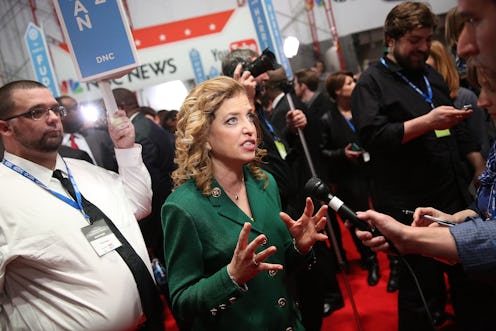News
Will Anyone Get In Trouble For The DNC Email Leak?
The Democratic National Committee is facing intense scrutiny just before the biggest week of the election cycle regarding leaked emails that allegedly appear to show an effort to support Hillary Clinton's campaign over Bernie Sanders. The email leak reportedly includes correspondence between seven top DNC officials, including Chairwoman Debbie Wasserman Schultz, chief financial officer Brad Marshall, and communications director Luis Miranda, which some claim prove the election was unfairly influenced against Sanders. Bustle has reached out to the DNC for comment. This is a blurry and unusual situation, so it's extremely difficult to say what the ramifications of this leak will be. Will anyone get in trouble for the DNC email leak? There could be consequences, but it's very unclear what they could be. Update: Sunday afternoon, Wasserman Schultz announced that she would resign as DNC chair after the convention ended.
According to the Department of Justice's guidebook for the federal prosecution of election offenses, the DNC's alleged actions as revealed in the emails don't really fall under any of the four types of election crimes: election fraud, patronage crimes, campaign financing crimes, and civil rights crimes. In order for the email leak to be considered election fraud, it would have to prove that the DNC directly influenced "the obtaining and marking of ballots, the counting and certification of election results, or the registration of voters" in favor of Clinton, and it simply doesn't do that.
There may be sufficient evidence to warrant an investigation by the Federal Elections Commission, but according to one of its chairs, that seems highly unlikely. The six-member commission is split along party lines, and its efficacy has suffered critically in recent years as a result. “The likelihood of the laws being enforced is slim,” Ann Ravel, the chairwoman of the FEC, told The New York Times during an interview in May. “I never want to give up, but I’m not under any illusions. People think the F.E.C. is dysfunctional. It’s worse than dysfunctional.”
There may not be legal repercussions, but Debbie Wasserman Schultz is already experiencing some consequences from the leak — she won't be speaking at or presiding over the convention this coming week. The chair was expected to have a primetime speaking role on the schedule and gavel the convention in and out, but both responsibilities have now been lifted — Rep. Marcia Fudge of Ohio will take Wasserman Schultz's place as convention chairwoman.
However, keeping Wasserman Schultz off the convention schedule might not be enough to placate the party progressives. Even before the emails leaked, thousands of people were accusing the DNC of election fraud, citing manipulation at caucuses, polling stations that allegedly lied to voters, and "discrepancies in vote tallies." Wasserman Schultz has long denied any allegations, stating even after Sanders endorsed her opponent, "I remain, as I have been from the beginning, neutral in the Presidential Democratic primary."
But now, the movement against the DNC and Clinton has been reignited in the wake of the allegations. The leaks could once again split the party, which was just stitching itself back together after Sanders' challenge to Clinton's long presumed nomination.
The DNC email leak does a lot more to threaten the unity and reputation of the party than any individual involved in the scandal. Although it doesn't seem likely that there will be legal ramifications from the emails themselves, it doesn't rule out a potential investigation into the DNC's actions in the election in the near future. For now, the leak will be a topic of discussion and investigation during the convention, where new information or accusations could come to light and bring new context to this situation.
